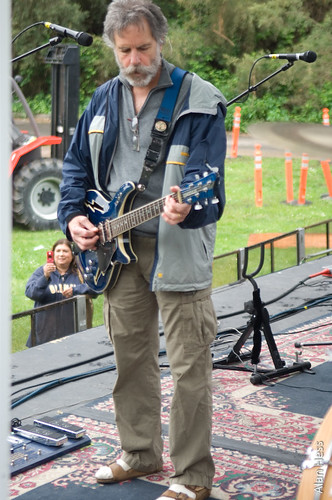Documentary sure to please Deadheads
DEADHEAD alert: "The Grateful Dead Movie," the film that almost killed Marin's longest-lived band, screens tonight at the Mill Valley Film Festival, then runs for a week (Monday through Oct. 26) at the Rafael Film Center.
It's being screened in the Rafael's largest theater in a high-definition widescreen format, with 5.1 surround sound tonight and a stereo mix next week. Should be quite a thrill ride.
At the same time, the newly-restored, 30-year-old rockumentary is being released as a double DVD with five hours of concert and backstage footage, plus new interviews with band members Bob Weir, Bill Kreutzmann and Donna Godcheaux.
As with so many things involving this most chaotic of rock groups, the story behind the movie may be as fascinating as the movie itself.
In the summer of 1974, the Dead had just limped home from a coked-out European tour, dragging along their behemoth, money-sucking, energy-devouring "Wall of Sound" system.
The band was exhausted and on the brink of breaking up when Jerry Garcia, an aspiring filmmaker, got the bright idea to document the band's five "farewell concerts" at Winterland.
What began as a relatively simple project would eventually take two and a half draining, demanding years to finish.
"In the way of the Grateful Dead, it evolved," deadpanned Dennis McNally, the band's longtime publicist, historian and author of "Long Strange Trip: The
Inside History of the Grateful Dead."
The movie was made at a heavy cost, and not just monetarily. It would end up with a price tag of $600,000, which would amount to a catering budget by today's standards. But, as McNally says, "In 1975, to the Grateful Dead, it was huge money." Garcia had to "duck, dodge and scheme, even within the Grateful Dead" to finance it, which contributed to the collapse of the Dead's record label and resulted in resentment toward him by some of his bandmates.
On a personal level, Garcia paid even more dearly. As his movie neared completion, he discovered heroin, which helped him relieve "the grinding stress of film editing," as McNally puts it.
"It certainly contributed to the collapse of Jerry's health," he said. "It was one of the reasons he took up opiates in the late '70s."
The movie got mixed reviews, and didn't make the band's money back. When all was said and done, the Dead regrouped and stayed together until Garcia's death in 1995.
So, in the end, was it all worth it? The music fans who gather in the Rafael and who buy the DVD will surely think so. It is, after all, the best record we have of what it was like to experience a Grateful Dead concert.
"Looking back on it, we're all pleased he did it because it's a truly great documentary," McNally said. "And it's one of the only documentaries made by a musician. Frame by frame, Jerry Garcia is responsible for it."
lll
4 weeks ago






